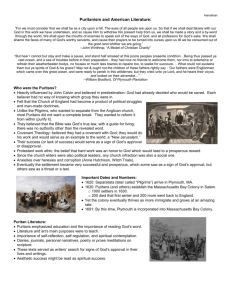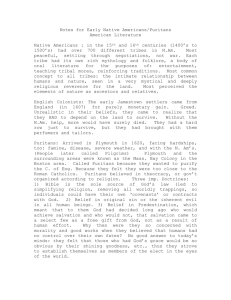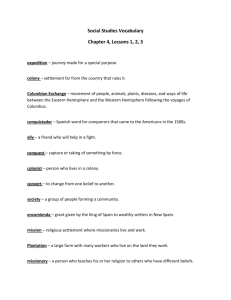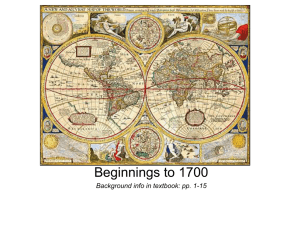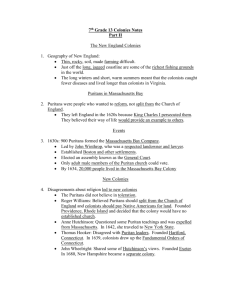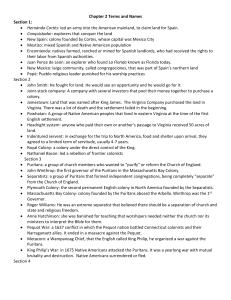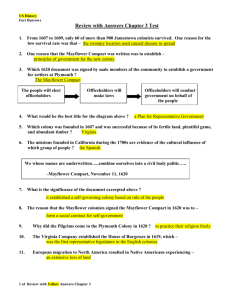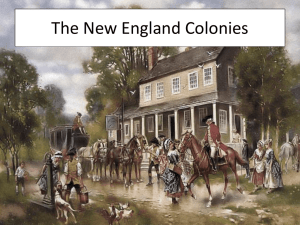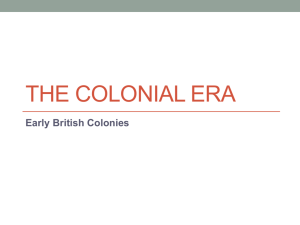Chapter 2 - Jacob Schulman
advertisement
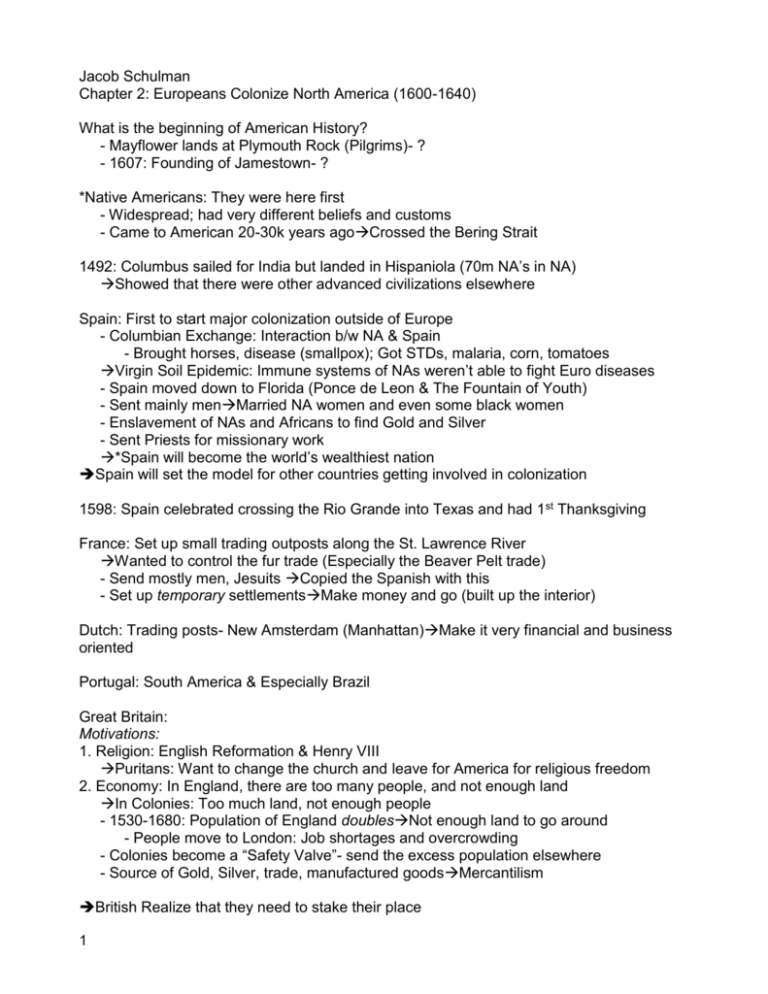
Jacob Schulman Chapter 2: Europeans Colonize North America (1600-1640) What is the beginning of American History? - Mayflower lands at Plymouth Rock (Pilgrims)- ? - 1607: Founding of Jamestown- ? *Native Americans: They were here first - Widespread; had very different beliefs and customs - Came to American 20-30k years agoCrossed the Bering Strait 1492: Columbus sailed for India but landed in Hispaniola (70m NA’s in NA) Showed that there were other advanced civilizations elsewhere Spain: First to start major colonization outside of Europe - Columbian Exchange: Interaction b/w NA & Spain - Brought horses, disease (smallpox); Got STDs, malaria, corn, tomatoes Virgin Soil Epidemic: Immune systems of NAs weren’t able to fight Euro diseases - Spain moved down to Florida (Ponce de Leon & The Fountain of Youth) - Sent mainly menMarried NA women and even some black women - Enslavement of NAs and Africans to find Gold and Silver - Sent Priests for missionary work *Spain will become the world’s wealthiest nation Spain will set the model for other countries getting involved in colonization 1598: Spain celebrated crossing the Rio Grande into Texas and had 1st Thanksgiving France: Set up small trading outposts along the St. Lawrence River Wanted to control the fur trade (Especially the Beaver Pelt trade) - Send mostly men, Jesuits Copied the Spanish with this - Set up temporary settlementsMake money and go (built up the interior) Dutch: Trading posts- New Amsterdam (Manhattan)Make it very financial and business oriented Portugal: South America & Especially Brazil Great Britain: Motivations: 1. Religion: English Reformation & Henry VIII Puritans: Want to change the church and leave for America for religious freedom 2. Economy: In England, there are too many people, and not enough land In Colonies: Too much land, not enough people - 1530-1680: Population of England doublesNot enough land to go around - People move to London: Job shortages and overcrowding - Colonies become a “Safety Valve”- send the excess population elsewhere - Source of Gold, Silver, trade, manufactured goodsMercantilism British Realize that they need to stake their place 1 1580s: Lost Colony of Roanoke (Sir Walter Raleigh)- 1st Colony 1606: Virginia Company Established (joint-stock company) 1607: Jamestown, Virginia established (*First Permanent English Settlement*) - Ships from GB: Discovery, Susan Constant, GodSpeed - 144 people originally cameVery proper and aristocratic (not well suited for this life) - *Not really permanent: Didn’t send whole families and such - Think that they will just enslave NAs to work for them (*Because the Spanish did*) - Set up on a swamp; Much disease - Name the colony Virginia (for Elizabeth- “the virgin queen”) Powhatan Confederacy: Trade with each other 1609-1610: “The Starving Time”- can’t grow food, some resort to cannibalism John Smith: Kept the military order in Jamestown *1611: Tobacco cultivation saves Virginia (John Rolfe) Becomes a major cash crop- something they can sell guaranteed - Daniel Boorstin: Plymouth is “A Colony founded upon smoke” - Tobacco needs land and labor (needs more land to grow) - “Head-Rights System”: 50 acres of land for every person you bring over Indentured servants worked for 7 years then got “Freedom Dues” (land and necessary goods to live on your own) - 1620: 40k pounds of tobacco cultivated; 1630: 1.5 million pounds cultivated Politics: 1619: House of BurgessesFirst representative assembly in America - Only male landowners could vote - Abolished temporarily; then brought back in 1629 * Colonists were very interested in Self-Government Native Americans: - Powhatan Confederacy: Most dominant Indian tribeTrade guns and knives for corn They will be peaceful for some time, but will come to fight - Colonists thought the NA men were lazy; NA men thought colonists were lazy - Different Beliefs: NA- Land is communal ; British- Land is personally owned Social: 1624- 1,300 settlers in Jamestown (very small) - Women: 1-3 children (less than in GB), few women Military: John Smith & military command in the colony Religion: Colonists are Anglican (more economically motivated than religiously) - Care more about making money - Chesapeake: Virginia & Maryland (Calvert Family- Roman Catholic [from Charles V]) - 1640: Maryland Toleration Act- Religious freedom for all Christians Puritans: Separatist Puritans: (Plymouth Colonies)Want a complete break from Church of England - Came from Holland (EngHollandPlymouth)Holland was too liberal Mayflower: 102 people, only 1/3 were Separatists - Came for religious freedom & Because Holland was too liberal - Mayflower Compact: (*Democracy)- Established political and legal stability - Encountered the PokanoketsAllied with them GunsFood Made the NAs stronger than their enemies - Celebrated Thanksgiving to commemorate the cooperation 2 Non-Separatist Puritans: (Calvinists, Mass Bay Colony)Want to purify and reform the Church of England Religion: John Winthrop- Governor 15-16x, sailed on the Arbella - “City Upon a Hill” (sermon)Stresses community is more important than the individual 1. Compares the Puritans to the Jews (Moses)Says they are the new Jews 2. Covenant: Puritans will accept God and his laws, God will protect them 3. Want to set up a religious commonwealthLive the perfect Christian life, and make God appealing to everyone else (Says they are watched [metaphoric hill]) If they fail, god will look bad, and people will mock God and his power America as a CUAHAmerica was the example for the world (unique, exceptionalism) Native Americans: Pequots- Connecticut based; Controlled the lucrative fur trade Puritans started moving into CT; Will go to war in 1637- almost exterminate them Land Distribution: General Court- Mass Bay Colony (decision making)Apply for land and set up towns (*Makes NE known for cities and towns) Politics: Theocracy- church leaders and political leaders are the same - Male, landowning, church members could be involved - System with a governor, & 2 House legislature Dissenters: 1. Anne Hutchinson: Challenges wisdom of Puritan leaders and says that anyone can get salvation (“covenant of grace”) 2. Roger Williams: Wants separation of church and state; more religious tolerance Moral Code: Strict CodeNo children out of wedlock, homosexuality, adultery Nathaniel Hawthorne: Scarlet Letter (adultery) *Freedom: The ability to practice their religion and the submission to god John Demos: “Life in Plymouth Colony”: 17th Century Family: Religious, strict, patriarchal, close knit, nuclear families Women & Men: “He for god only, she for got in him.” - Men: Heads of the family, religious guardians - Women: Seen as evil due to Eve’s actionsLess trustworthy, “tainted” Adultery: Tried to keep all stabilityAdultery hurt this Courts became involved if the solution couldn’t be found at home - Double Standard: Women more severely punished than men (they were violating their husbands and the community) - Married men got off very well compared to women Some situations were ridiculous, but not every family was really messed up Filial piety was expected 3
